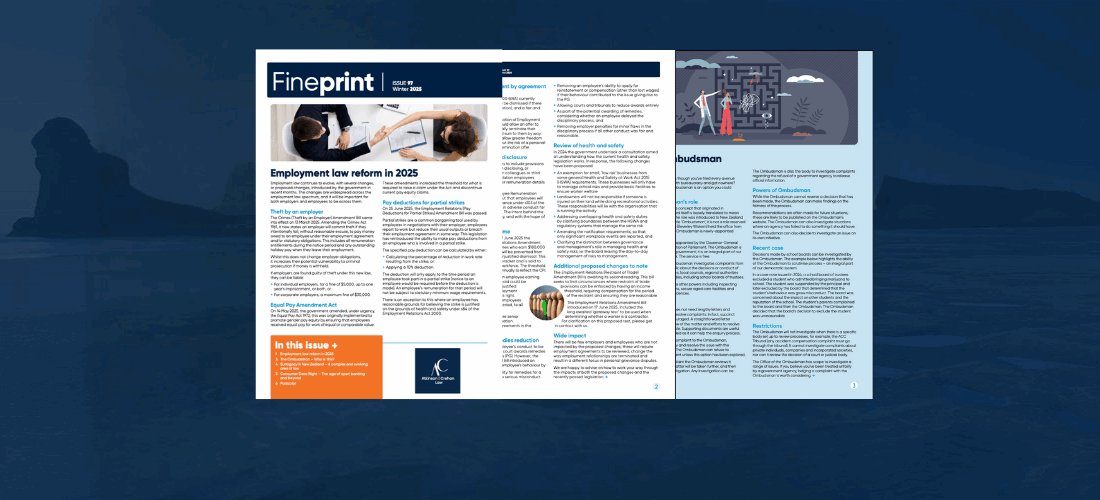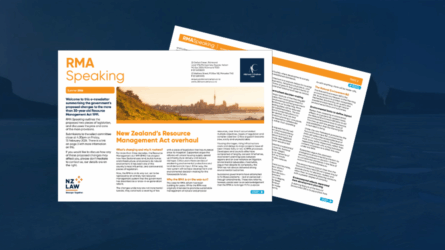Fineprint, Winter 2025, No 97
Inside:
- Employment law reform in 2025
- The Ombudsman – Who is this?
- Surrogacy in New Zealand – A complex and evolving area of law
- Consumer Data Right – The age of open banking and beyond
- Postscript
Employment law reform in 2025
Employment law continues to evolve, with several changes, or proposed changes, introduced by the government in recent months. The changes are widespread across the employment law spectrum, and it will be important for both employers and employees to be across them.
Theft by an employer
The Crimes (Theft by an Employer) Amendment Bill came into effect on 13 March 2025. Amending the Crimes Act 1961, it now states an employer will commit theft if they intentionally fail, without reasonable excuse, to pay money owed to an employee under their employment agreement and/or statutory obligations. This includes all remuneration entitlements during the notice period and any outstanding holiday pay when they leave their employment. Whilst this does not change employer obligations, it increases their potential vulnerability to criminal prosecution if money is withheld. If employers are found guilty of theft under this new law, they can be liable:
+ For individual employers, for a fine of $5,000, up to one year’s imprisonment, or both, or
+ For corporate employers, a maximum fine of $30,000.
Equal Pay Amendment Act
On 14 May 2025, the government amended, under urgency, the Equal Pay Act 1972; this was originally implemented to promote gender pay equity by ensuring that employees received equal pay for work of equal or comparable value.
These amendments increased the threshold for what is required to raise a claim under the Act and discontinue current pay equity claims.
Pay deductions for partial strikes
On 25 June 2025, the Employment Relations (Pay Deductions for Partial Strikes) Amendment Bill was passed.
Partial strikes are a common bargaining tool used by employees in negotiations with their employer; employees report to work but reduce their usual outputs or breach their employment agreement in some way. This legislation has reintroduced the ability to make pay deductions from an employee who is involved in a partial strike.
The specified pay deduction can be calculated by either:
- Calculating the percentage of reduction in work rate resulting from the strike, or
- Applying a 10% deduction.
The deduction will only apply to the time period an employee took part in a partial strike (notice to an employee would be required before the deduction is made). An employee’s remuneration for that period will not be subject to statutory minimum wage requirements.
There is an exception to this where an employee has reasonable grounds for believing the strike is justified on the grounds of health and safety under s84 of the Employment Relations Act 2000.
Termination of employment by agreement proposal
The Employment Relations Act 2000 (ERA) currently states that an employee can only be dismissed if there is a good reason to do so (justification), and a fair and proper process is followed.
The Employment Relations (Termination of Employment by Agreement) Amendment Bill would allow an offer to be made to an employee to mutually terminate their employment by paying a specified sum to them by way of settlement. This change would allow greater freedom for parties to negotiate exits without the risk of a personal grievance claim arising from the termination offer.
Employee remuneration disclosure
The ERA currently allows employers to include provisions that prevent their employees from disclosing, or discussing, their remuneration with colleagues or third parties. Under this proposed legislation employees would not be required to keep their remuneration details confidential.
The Employment Relations (Employee Remuneration Disclosure) Amendment Bill sets out that employees will have grounds for a personal grievance under s103 of the ERA, if an employer has engaged in adverse conduct for a remuneration disclosure reason. The intent behind the Bill is to increase pay transparency, and with the hope of addressing pay inequities.
Unjustified dismissal regime
The government announced on 17 June 2025 the introduction of the Employment Relations Amendment Bill. The bill proposes that employees who earn $180,000 per annum or more (in base pay) will be prevented from raising a personal grievance for unjustified dismissal. This threshold aligns with the top tax bracket and is said to affect about 3.4% of the current workforce. The threshold would subsequently be adjusted annually to reflect the CPI.
Under this proposed legislation, an employee earning above the specified income threshold could be dismissed without the risk of an unjustified dismissal claim – unless their employment agreement explicitly preserves this right. This change will apply to all new employees and, after a 12-month transition period, to all employees.
If this bill is passed, we expect more senior employees to negotiate compensation provisions in their employment agreements in the event of termination.
Personal grievance remedies reduction
The ERA currently requires an employee’s conduct to be considered when the authority or court awards remedies for successful personal grievances (PG). However, the Employment Relations Amendment Bill introduced on 17 June, gives greater weight to an employee’s behaviour by:
- Removing an employee’s eligibility for remedies for a PG if their behaviour amounts to serious misconduct
- Removing an employee’s ability to apply for reinstatement or compensation (other than lost wages) if their behaviour contributed to the issue giving rise to the PG
- Allowing courts and tribunals to reduce awards entirely
- As part of the potential awarding of remedies, considering whether an employee delayed the disciplinary process, and
- Removing employer penalties for minor flaws in the disciplinary process if all other conduct was fair and reasonable.
Review of health and safety
In 2024 the government undertook a consultation aimed at understanding how the current health and safety legislation works. In response, the following changes have been proposed:
- An exemption for small, ‘low risk’ businesses from some general Health and Safety at Work Act 2015 (HSWA) requirements. These businesses will only have to manage critical risks and provide basic facilities to ensure worker welfare
- Landowners will not be responsible if someone is injured on their land while doing recreational activities. These responsibilities will lie with the organisation that is running the activity
- Addressing overlapping health and safety duties by clarifying boundaries between the HSWA and regulatory systems that manage the same risk
- Amending the notification requirements, so that only significant workplace events are reported, and
- Clarifying the distinction between governance and management’s role in managing health and safety risks, ie: the board leaving the day-to-day management of risks to management.
Additional proposed changes to note
The Employment Relations (Restraint of Trade) Amendment Bill is awaiting its second reading. This bill seeks to limit circumstances where restraint of trade provisions can be enforced by having an income threshold, requiring compensation for the period of the restraint and ensuring they are reasonable.
The Employment Relations Amendment Bill introduced on 17 June 2025, included the long awaited ‘gateway test’ to be used when determining whether a worker is a contractor. For clarification on this proposed test, please get in contact with us.
Wide impact
There will be few employers and employees who are not impacted by the proposed changes; these will require employment agreements to be reviewed, change the way employment relationships are terminated and result in a different focus in personal grievance disputes.



